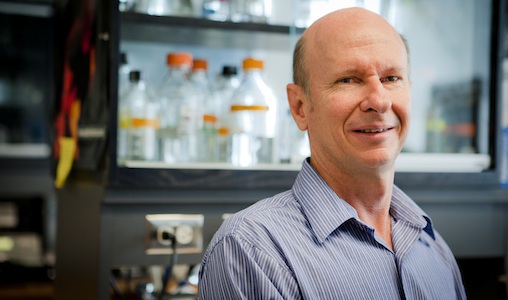If you ever dreamed of becoming a marine biologist growing up, you probably pictured swimming with dolphins, saving whales or clearing sand for baby turtles. Marine microbiologist Russell Hill, however, is far more interested in sea life at the molecular level — and says Baltimore is already a world leader in the space.
“Most of the life on our planet is microbial. If humans and animals went away tomorrow, the microbes would be fine. The world would go on,” said Hill, 57, the director of Baltimore’s Institute of Marine and Environmental Technology. “If you want to understand things like climate change, you need to consider the microbes.”
Hill, originally from South Africa, has been in Maryland for the last 20 years, and now lives Charles Village. In September 2012, he was named director of the IMET program, which is a partnership between the University of Maryland Center for Environmental Science, the University of Maryland, Baltimore County and the University of Maryland, Baltimore. IMET was created in 2010.
The mission: conduct world-class marine and environmental research. The focus: practical applications of marine technologies.
In large part, Hill says, that has meant focusing on the commercialization of IMET research, an effort assistant director Nick Hammond has led up since joining IMET last year.
Hammond, co-founder and former CEO of biotech firm Ablitech, has helped set expectations around tech transfer: universities shouldn’t expect quick payouts, but there is certainly the possibility of a real return, Hill said.
Technical.ly Baltimore spoke with Hill about IMET’s entrepreneurial mindset and the three biggest areas of research the organization has taken on.
(Edited for length and clarity.)
###
Why should the wider world care about IMET’s work?
We’re really dealing with some of the key issues dealing with food and environmental sustainability, energy and human health.
This is not just your standard university research department. We are doing more than the basic fundamental research. We are looking for the application. We stimulate tech transfer in the state of Maryland. We interact with small biotech companies in Maryland, and we see our students move on from their work here into biotech.
One of those applications is in food production, right?
We are a world leader in sustainable marine aqua-culture. We’re growing high value marine fish in a highly sustainable way with new technology that we are looking to commercialize.
What’s different about it than any other farm-raised fish we’ve eaten before?
We take Baltimore city water and add salt and make our own sea water, and it stays in a tank indefinitely. There is zero discharge into the environment and no need to transport water to us.
The thing with farm raising sea-water fish is that much of it can be heavily polluting. With our method, it means you can have a lot of control and also limit disease.
What are you growing there at IMET?
Two fish of high value — Mediterranean sea bass and Mediterranean gilt-head sea bream. They’re being raised in experimental systems, but we have commercialized the production already.
Can I walk into a Baltimore restaurant and have some IMET “catch of the day”?
(Laughs.) Well, we produce in relatively small quantities at this stage, but we do partner with Baltimore restaurants. It’s our Aquaculture Research Center led by Yoni Zohar, who has gotten some very nice coverage for it.
I’ve had [our sea bass] at McCormick & Schmick’s across [Pratt Street]. They had it highlighted on their menu.
TEDCO, the state-backed investment fund, announced in April it was supporting other IMET research.
Kevin Sowers has done amazing science, taken him 20 years, to isolate some microbes from sediments from the Baltimore Inner Harbor that can degrade PCBs very efficiently. It could change how we clean industrial sites for new use.
What’s an example of a fully-fledged company that has developed out of research from a professor at IMET?
Baltimore biotech company Hytek-Bio, led by Feng Chen. What we’re doing is using micro-algae to clean up carbon dioxide, capturing it as it comes out of power plants to make biofuels. We’ve received funding from a Canadian source to expand this technology to treat larger amounts of carbon dixode at a more mass scale.
Is marine biotechnology a real differentiator for the Baltimore innovation economy?
The state of Maryland has been very far-sighted in supporting the university system, more so than most in this country. This is paying off with the biotech industry in the state. [Marine research specifically] will prove to be a good investment, and something we are a world leader in.
Before you go...
Please consider supporting Technical.ly to keep our independent journalism strong. Unlike most business-focused media outlets, we don’t have a paywall. Instead, we count on your personal and organizational support.
3 ways to support our work:- Contribute to the Journalism Fund. Charitable giving ensures our information remains free and accessible for residents to discover workforce programs and entrepreneurship pathways. This includes philanthropic grants and individual tax-deductible donations from readers like you.
- Use our Preferred Partners. Our directory of vetted providers offers high-quality recommendations for services our readers need, and each referral supports our journalism.
- Use our services. If you need entrepreneurs and tech leaders to buy your services, are seeking technologists to hire or want more professionals to know about your ecosystem, Technical.ly has the biggest and most engaged audience in the mid-Atlantic. We help companies tell their stories and answer big questions to meet and serve our community.
Join our growing Slack community
Join 5,000 tech professionals and entrepreneurs in our community Slack today!

The person charged in the UnitedHealthcare CEO shooting had a ton of tech connections

From rejection to innovation: How I built a tool to beat AI hiring algorithms at their own game

Where are the country’s most vibrant tech and startup communities?



